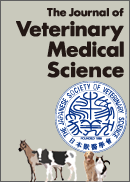Volume 84, Issue 1
January
Displaying 1-29 of 29 articles from this issue
- |<
- <
- 1
- >
- >|
Avian Pathology
-
2022Volume 84Issue 1 Pages 1-5
Published: 2022
Released on J-STAGE: January 07, 2022
Advance online publication: November 17, 2021Download PDF (907K)
Bacteriology
-
2022Volume 84Issue 1 Pages 90-93
Published: 2022
Released on J-STAGE: January 13, 2022
Advance online publication: November 18, 2021Download PDF (799K) -
2022Volume 84Issue 1 Pages 129-132
Published: 2022
Released on J-STAGE: January 24, 2022
Advance online publication: December 02, 2021Download PDF (912K)
Clinical Pathology
-
2022Volume 84Issue 1 Pages 94-101
Published: 2022
Released on J-STAGE: January 13, 2022
Advance online publication: November 18, 2021Download PDF (1066K)
Immunology
-
2022Volume 84Issue 1 Pages 102-113
Published: 2022
Released on J-STAGE: January 13, 2022
Advance online publication: November 19, 2021Download PDF (1175K) -
2022Volume 84Issue 1 Pages 6-15
Published: 2022
Released on J-STAGE: January 07, 2022
Advance online publication: November 18, 2021Download PDF (1975K)
Internal Medicine
-
2022Volume 84Issue 1 Pages 16-19
Published: 2022
Released on J-STAGE: January 07, 2022
Advance online publication: November 23, 2021Download PDF (996K) -
2022Volume 84Issue 1 Pages 133-141
Published: 2022
Released on J-STAGE: January 24, 2022
Advance online publication: November 25, 2021Download PDF (3290K) -
2022Volume 84Issue 1 Pages 20-24
Published: 2022
Released on J-STAGE: January 07, 2022
Advance online publication: December 01, 2021Download PDF (1993K) -
2022Volume 84Issue 1 Pages 25-30
Published: 2022
Released on J-STAGE: January 07, 2022
Advance online publication: December 03, 2021Download PDF (1328K) -
2022Volume 84Issue 1 Pages 31-35
Published: 2022
Released on J-STAGE: January 07, 2022
Advance online publication: December 03, 2021Download PDF (1339K) -
2022Volume 84Issue 1 Pages 36-39
Published: 2022
Released on J-STAGE: January 07, 2022
Advance online publication: December 06, 2021Download PDF (2399K) -
2022Volume 84Issue 1 Pages 142-148
Published: 2022
Released on J-STAGE: January 24, 2022
Advance online publication: December 06, 2021Download PDF (1456K) -
2022Volume 84Issue 1 Pages 149-152
Published: 2022
Released on J-STAGE: January 24, 2022
Advance online publication: November 16, 2021Download PDF (761K)
Parasitology
-
2022Volume 84Issue 1 Pages 40-47
Published: 2022
Released on J-STAGE: January 07, 2022
Advance online publication: December 06, 2021Download PDF (1111K)
Pathology
-
2022Volume 84Issue 1 Pages 48-52
Published: 2022
Released on J-STAGE: January 07, 2022
Advance online publication: November 18, 2021Download PDF (1714K) -
2022Volume 84Issue 1 Pages 53-58
Published: 2022
Released on J-STAGE: January 07, 2022
Advance online publication: November 23, 2021Download PDF (1640K)
Physiology
-
2022Volume 84Issue 1 Pages 59-63
Published: 2022
Released on J-STAGE: January 07, 2022
Advance online publication: November 12, 2021Download PDF (2702K)
Surgery
-
2022Volume 84Issue 1 Pages 114-120
Published: 2022
Released on J-STAGE: January 13, 2022
Advance online publication: December 06, 2021Download PDF (1665K) -
2022Volume 84Issue 1 Pages 64-68
Published: 2022
Released on J-STAGE: January 07, 2022
Advance online publication: November 22, 2021Download PDF (1783K) -
2022Volume 84Issue 1 Pages 69-73
Published: 2022
Released on J-STAGE: January 07, 2022
Advance online publication: November 29, 2021Download PDF (1300K)
Theriogenology
-
2022Volume 84Issue 1 Pages 74-81
Published: 2022
Released on J-STAGE: January 07, 2022
Advance online publication: November 25, 2021Download PDF (1607K)
Toxicology
-
2022Volume 84Issue 1 Pages 153-156
Published: 2022
Released on J-STAGE: January 24, 2022
Advance online publication: December 10, 2021Download PDF (720K)
Virology
-
2022Volume 84Issue 1 Pages 82-89
Published: 2022
Released on J-STAGE: January 07, 2022
Advance online publication: November 23, 2021Download PDF (1076K) -
2022Volume 84Issue 1 Pages 121-128
Published: 2022
Released on J-STAGE: January 13, 2022
Advance online publication: December 02, 2021Download PDF (1478K) -
2022Volume 84Issue 1 Pages 157-165
Published: 2022
Released on J-STAGE: January 24, 2022
Advance online publication: December 09, 2021Download PDF (3773K) -
2022Volume 84Issue 1 Pages 166-170
Published: 2022
Released on J-STAGE: January 24, 2022
Advance online publication: December 06, 2021Download PDF (1064K)
Wildlife Science
-
2022Volume 84Issue 1 Pages 171-180
Published: 2022
Released on J-STAGE: January 24, 2022
Advance online publication: December 03, 2021Download PDF (3010K) -
2022Volume 84Issue 1 Pages 181-185
Published: 2022
Released on J-STAGE: January 24, 2022
Advance online publication: December 03, 2021Download PDF (1234K)
- |<
- <
- 1
- >
- >|
